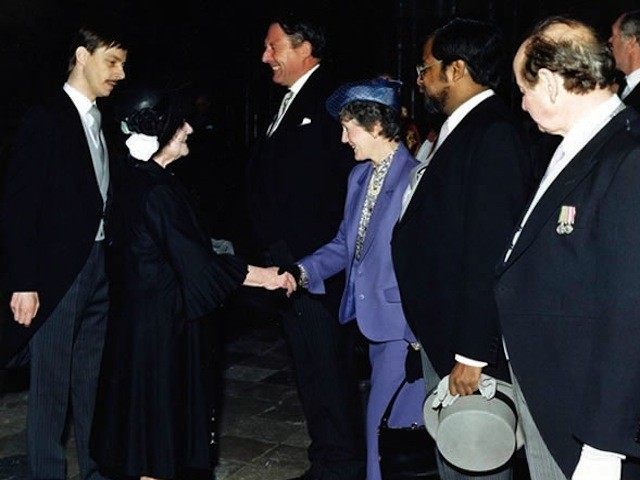In a move that would have delighted Andrew Breitbart, a prominent British historian is using the internet to overthrow mainstream media’s monopoly by producing his own 96-part documentary series on YouTube.
Breitbart recently caught up with publisher and historian Robert Smith, founder of Smith’s Peerage, Executive Chairman of the Manorial Society of Great Britain, and divisor of one of the most original concepts to emerge in contemporary historical research and popularization.
“Religion gave – and still gives – moral compass outside the State and the political class, and it seems to me that religion still retains that primary role today,” he said. An insight of important weight, given that its author doesn’t consider himself a believer. (He is always quick to add with a humility rarely seen these days, “Though I could be wrong!”)
The internet revolution forever overturned the political and news landscapes, giving to the ordinary man on the street the same platform of access as the most influential TV commentators.
That very same revolution is now continuing its liberating sweep outwards – sometimes into other sectors once considered the exclusive preserve of the elite.
In a world-first, Smith has decided to produce his own TV-quality 96-part video series At the Edge of the World on the history of England – uploading it directly on to YouTube as each episode is finished, making it immediately available to the largest possible audience.
“History has been my abiding interest since I can remember. The subject gives you a bit of everything; in no particular order: philosophy, fine art, drama, music, medicine, science, geography, and religion,” Smith told Breitbart. “It helps you to learn how to understand other people, and thus how to live.”
Smith, who graduated in history in the 1960s, said that one of his inspirations to make this series was to break free of “education authorities” who “ignore, or do not understand, that history was once the future – history is seen as the past, not only by the educational establishment, but by the students this establishment spews out, with little knowledge of the past that made us what we are.”
One of the most immediate breaks with convention that the viewer will see, is the enormous importance given to religion. “Not to make any religious point, but to help viewers realize that religion in the period under review – from the fall of Rome in AD 41 0 to the death of William the Conqueror in 1087 – religion was everything. Everyone – even truly wicked people – believed in God and the Afterlife.”
Smith’s refreshing take will jar with many more conventional secular-liberal narratives: “I lay out the facts (I am in favor of dates and chronology): the Silk Road was an early, medieval form of globalization!” he enthuses.
“I wrote this series with America in mind – North America in particular,” said Smith, who both wrote and presents the series. “From 1620, future citizens of the United States – and about 10 years later, of Canada – came from Britain (the Irish in great numbers did not begin until two centuries later, Germans, Italians, and Russians later than that.)”
“Americans and Canadians have early medieval ancestors from the islands ‘at the edge of the world’ as much as I do, a fact not missed by the great US military and naval academies and colleges where British and European history are taught.”
Jeremy Black, Professor of History at Exeter University, and himself prolific author of over 90 books, told Breitbart: “I think that beyond the exceptionally high quality of this endeavor, perhaps Robert Smith’s most enduring and certainly Promethean contribution to the popularization of history will be to restore a sense of the historical narrative back to the ordinary person.”
Black added: “In a very real sense the ghosts from our history are very much alive and walking among us – one has only to look at the explosion of the Tea Party movement in the United States today – influencing us, haunting us with the ideas that we in our turn will pass on to our own posterity. Effortlessly uncovering the hidden history within the present is Smith’s great genius.”
Smith’s unconventional approach even reveals itself in the choice of wardrobe: “I took the unusual step of buying a lot of extraordinary designer clothes, in hopes that this would appeal more to the young than a chap in a collar and tie.”
As an established publisher (with well-received books in the catalogue on the Monarchy, the House of Commons, the House of Lords and The Queen’s Golden Jubilee) Smith acknowledges that this is something new for him: “This is the first time I have put my head above the parapet as a writer, as opposed to hiding behind being commissioning editor.”
Perhaps as a former Fleet Street man himself (he was once chief sub-editor of the UK’s Guardian in the 1980s), Robert Smith got the idea of breaking free after seeing how the internet could transform and revitalize his former profession.
Benjamin Harnwell is the director of the Rome-based Dignitatis Humanae Institute. Follow him on Twitter: @ben_harnwell.
The first episodes of the Manorial Society of Great Britain’s At the Edge of the World video series are now available on YouTube.

COMMENTS
Please let us know if you're having issues with commenting.